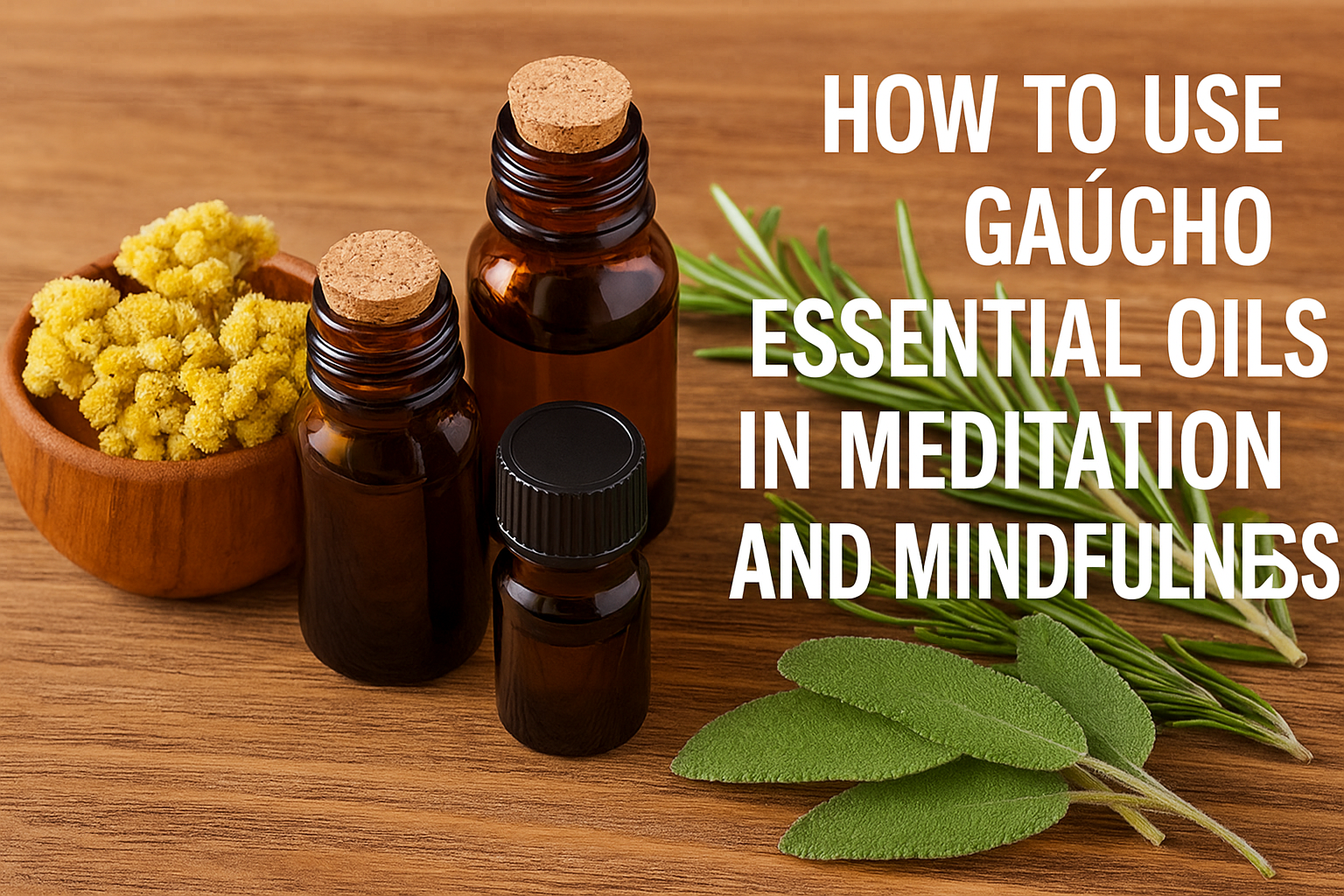In the plains of Rio Grande do Sul, long before the modern rise of meditation and mindfulness, Gaúcho communities used herbal rituals to enter states of reflection, stillness, and emotional clarity.
These practices were passed down through storytelling, shared experiences, and connection to nature.
Today, the essential oils derived from native plants — like Marcela, Carqueja, Boldinho, Erva-doce, and Mint — offer a way to return to this ancient wisdom. When used mindfully, they become more than scents; they become tools for presence, healing, and spiritual anchoring.
This guide explores how to integrate Gaúcho essential oils into meditation, breathwork, and personal rituals — no matter your experience level.
Why Use Essential Oils in Meditation?
Meditation is about awareness. Essential oils support that awareness by:
- Activating the senses
- Anchoring attention to the present
- Enhancing breath and body connection
- Opening emotional pathways
- Deepening ritual and intention
In Gaúcho tradition, herbs were used to prepare the body and space for reflection. Whether through smudging, baths, or infusions, plants helped create the inner stillness needed to listen to oneself and connect with something greater.
Choosing the Right Gaúcho Oils for Mindfulness
Each oil carries a unique energy and emotional vibration. Here are the most common ones used in southern Brazil and how they translate into meditation support:
1. Marcela (Achyrocline satureioides)
- Emotional energy: Calm, safety, comfort
- Ideal for: Evening meditations, anxiety, emotional softness
- Scent: Gentle, herbal-sweet
Marcela is excellent for those who struggle to relax or who feel emotionally guarded.
2. Carqueja (Baccharis trimera)
- Emotional energy: Boundaries, detox, release
- Ideal for: Full moon meditations, inner cleansing, shadow work
- Scent: Bitter, assertive, earthy
Carqueja clears the mental and emotional clutter, perfect for deep introspection.
3. Boldinho (Peumus boldus)
- Emotional energy: Grounding, protection, ancestral connection
- Ideal for: Morning practices, root chakra work, energetic fatigue
- Scent: Woody, strong, slightly smoky
Boldinho brings presence and stability, anchoring you when thoughts are scattered.
4. Erva-doce (Fennel)
- Emotional energy: Softness, intuition, feminine energy
- Ideal for: Heart-centered meditations, full-body awareness
- Scent: Sweet, warm, slightly licorice-like
Use Erva-doce to tune into emotional sensitivity or during nurturing practices.
5. Mint (Hortelã)
- Emotional energy: Clarity, wakefulness, cooling
- Ideal for: Morning meditation, breathing exercises, brain fog
- Scent: Sharp, refreshing, menthol
Mint wakes up your focus and clears mental distractions — great before setting intentions.
Ways to Use Essential Oils in Meditation
1. Diffusion
Add 3–6 drops of oil to a diffuser before or during your practice. Use one oil or create a mindful blend.
2. Anointing Ritual
Apply a drop (diluted) to key energy points:
- Third eye (intuition)
- Chest (heart)
- Wrists (presence)
- Feet (grounding)
Rub gently and inhale the aroma with eyes closed.
3. Meditation Balm or Oil
Create a personalized meditation oil:
- 30 ml carrier oil (jojoba, almond)
- 6–8 drops total of essential oils
- Apply before sitting or while lying down
Massage into neck, shoulders, or temples for deeper relaxation.
4. Scent Anchor
Use a roll-on blend at the start of every session to create a scent-mindfulness connection. Over time, the aroma will help you enter a meditative state more easily.
5. Aromatic Breathwork
Add 1–2 drops of oil to a cotton pad or personal inhaler. Practice 4-7-8 breathing while inhaling the aroma:
- Inhale 4 seconds
- Hold 7 seconds
- Exhale 8 seconds
Use oils like Mint or Marcela to enhance calm and breath awareness.
Sample Gaúcho Meditation Blends
Blend 1: “Calm of the Pampa”
For stress relief and soft emotional opening.
- 4 drops Marcela
- 2 drops Erva-doce
- 2 drops Lavender
- 30 ml carrier oil
Use in diffuser or anointing oil. Ideal for evenings.
Blend 2: “Inner Cleanse”
For emotional detox, clarity, and release.
- 2 drops Carqueja
- 2 drops Boldinho
- 2 drops Lemon
- 2 drops Rosemary
- 30 ml carrier oil
Use during full moon or journaling after meditation.
Blend 3: “Sacred Ground”
For presence, strength, and inner stability.
- 3 drops Boldinho
- 2 drops Marcela
- 2 drops Frankincense
- 1 drop Vetiver
- 30 ml Olive oil
Massage into soles of feet and lower back before sitting.
Blend 4: “Gaúcho Awakening”
For morning clarity and breath-centered practices.
- 3 drops Mint
- 2 drops Rosemary
- 2 drops Lemon
- 1 drop Carqueja
- 30 ml carrier oil
Apply to chest and temples before meditation or yoga.
Creating a Meditation Ritual With Oils
Step 1: Prepare the Space
- Dim lights
- Use diffuser or light an herbal candle
- Play soft instrumental music (optional)
Step 2: Set Your Intention
Hold the oil bottle. Say aloud or silently:
“I allow this plant to guide me into stillness.”
Breathe in the scent slowly for 3–5 full breaths.
Step 3: Begin Your Practice
Choose one of the following:
- Silent seated meditation
- Body scan
- Visualization
- Breath awareness
- Guided audio
Let the oil become an anchor for focus. If your mind wanders, return to the scent.
Step 4: Close With Gratitude
Rub a bit more oil into your hands. Place one hand on heart, one on belly.
Whisper or think:
“Thank you to the plants, the land, and this moment.”
Energy Point Application for Mindfulness
Use diluted oils on chakra or energetic points to deepen your experience.
| Point | Location | Suggested Oil | Purpose |
|---|---|---|---|
| Third Eye | Between brows | Mint / Marcela | Focus, clarity |
| Heart | Center of chest | Erva-doce / Marcela | Softness, compassion |
| Solar Plexus | Above navel | Carqueja / Lemon | Willpower, confidence |
| Root | Base of spine | Boldinho / Vetiver | Grounding, security |
| Crown | Top of head | Lavender / Frankincense | Spiritual connection |
Apply before your session with slow, intentional movement.
Using Oils in Group Meditation or Circles
If facilitating group practice:
- Diffuse calming oils (Marcela, Erva-doce) for all
- Offer optional anointing before opening circle
- Use grounding oils (Boldinho, Vetiver) to close session
- Keep oils accessible but optional — respect sensitivities
This builds ritual unity and enhances collective stillness.
Tracking Your Mindfulness Journey With Oils
Keep a blending + meditation journal.
Record:
- The oils you used
- How you applied them
- The emotional effect
- What thoughts or emotions surfaced
- Shifts in breath, posture, presence
Over time, this deepens your relationship with the plant allies.
Mindfulness Practices Specific to the Gaúcho Tradition
While not always labeled as “meditation,” many Gaúcho rituals were forms of mindfulness:
- Drinking chimarrão slowly with intention
- Preparing herbs with gratitude
- Walking in silence through the fields
- Sitting at dusk with a fire or candle
- Listening to wind and bird calls
Try integrating oils into these practices to blend the old and the new.
Safety Notes for Meditation Use
- Always dilute oils before applying to skin
- Do not apply mint or strong oils (Carqueja) near eyes
- If pregnant or nursing, avoid bold oils like Carqueja or Boldinho
- Use only pure essential oils — avoid fragrance oils
- Ventilate well if diffusing in small spaces
- Be mindful of others in group settings
Final Thoughts: Stillness Rooted in the South
The plants of the southern Brazilian plains are not just for healing the body — they carry the energy of peace, depth, and ancestral connection.
When you meditate with Marcela, Carqueja, or Boldinho, you’re doing more than smelling a scent — you’re entering a conversation with the land.
Let these oils become your partners in presence. Let them soften your heart, anchor your awareness, and remind you of who you are beneath all the noise.
Meditation is a return. The plants know the way.

Marcela Cardozo is passionate about Southern Brazilian traditions and the cultural stories carried through natural scents. She blends knowledge of native herbs, essential oils, and regional rituals to create practical and inspiring content. Her writing connects ancestral wisdom with modern living, offering readers simple ways to bring authenticity, well-being, and meaning into their everyday lives.
